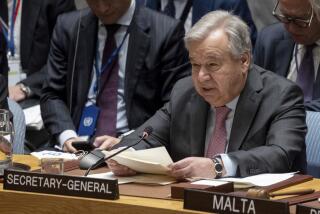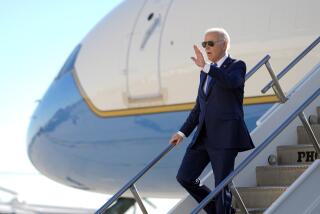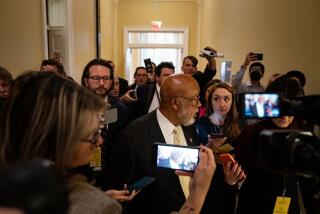Chief Inspector to Hand Over Edited Report by Monday
- Share via
UNITED NATIONS — The chief U.N. arms inspector said Tuesday that he would present the Security Council with Iraq’s mammoth weapons declaration by Monday after editing out manufacturing information and the names of foreign suppliers.
Hans Blix said that an initial examination of the presentation showed it contained mostly recycled information but that there may be “something new” in the chemical and nuclear sections. He promised a fuller assessment by Tuesday. During a luncheon with U.N. Secretary-General Kofi Annan and Security Council ambassadors, Blix also assured diplomats that he, not the U.S., was in control of the report’s analysis and distribution after a controversial release of the Iraqi declaration to Washington on Sunday.
The Security Council decided Friday to allow Blix to vet the declaration before releasing it to the council’s 15 members over the weekend, but U.S. officials arranged for the five permanent members to obtain the uncut copies immediately. They argued that the U.S., France, Britain, Russia and China are already nuclear powers and thus would not learn anything about building such weapons from the report.
In a last-minute decision late Sunday and with the approval of the Security Council’s president, the U.S. took the council’s sole copy to Washington to reproduce it and begin analyzing its 11,807 pages, saying the U.S. had the fastest and most secure reproduction facilities. The U.S. gave copies to the other four permanent members Monday night and Tuesday morning. It returned the original to Blix’s office Tuesday.
While the permanent members were happy to gain access to the full report days earlier than expected, the U.S. move angered others on the council. Several of the 10 council members who hold two-year rotating seats protested the unequal distribution and on Tuesday pushed to have access to the original version, if not their own copies.
Syria’s ambassador, Mikhail Wehbe, demanded that all members receive the full declaration. But other diplomats said privately that concerns about passing on weapons know-how to countries such as Syria that don’t have it led to the two-tier distribution.
Norway, Ireland, Singapore and Mexico said at the luncheon that none of the excised information should be a basis for declaring a “material breach” because they could not judge its veracity without seeing it. Norwegian Ambassador Ole Peter Kolby said that all members should have the same access to the information and that the entire council, not just the U.S., must make any decision about Iraq’s compliance. Russian Ambassador Sergei V. Lavrov proposed that all members have access to the full document -- though not copies -- so they could make the necessary judgments.
Iraq accused the U.S. of “unprecedented blackmail” in obtaining the declaration. “America aims to manipulate the U.N. documents to find a cover for aggression against Iraq,” Foreign Minister Naji Sabri said Tuesday. “It violated the authority of the 10 nonpermanent members, who represent the U.N. member states and who, according to the U.N. Charter, are supposed to enjoy the same rights and duties enjoyed by the council’s permanent members.”
That the statement echoed the arguments of some Security Council members may foreshadow problems for the council’s long-sought unity on Iraq.
“When Iraq and a third of the Security Council are saying the same thing, we’re in trouble,” said one council diplomat. “Iraq would like nothing better than to see us divided again.”
Blix also said the identities of the foreign companies that have supplied Iraq with material that could be used to make weapons should remain confidential -- not because he wanted to shield firms guilty of skirting U.N. sanctions or U.S. export controls but because the companies are a valuable source of intelligence. He added that there was no guarantee that the firms knew the material they were selling was going to Iraq or being used for military purposes.
“Supplier information was certainly useful for UNSCOM [the previous inspection regime] in the past,” said Ewen Buchanan of the U.N. Monitoring, Verification and Inspection Commission, or UNMOVIC.
“It was quite nice for us to be able to go to a company and say, ‘Did you sell them this equipment; who did you deal with; where did you ship them to?’ It was one way of finding out Iraq’s front companies and middlemen,” he said. “If we put their name on the front page of the Los Angeles Times, would they speak to us again? And if equipment was sold to a middleman and ended up in Iraq, should they be blamed for that?”
Blix also sought to rebut criticism from Washington that the inspection team isn’t large or aggressive enough to ferret out hidden weapons in Iraq. Additional inspectors arrived in Iraq over the weekend, bringing the number to 70. At least 30 more will arrive by the end of the month, and UNMOVIC moved its January training session up a week to prepare more experts -- especially from the U.S. -- to bolster the team. About 300 inspectors will ultimately be working in Iraq.
With the additional help, inspectors in Iraq conducted the most comprehensive searches so far Tuesday, covering seven sites. Germ warfare experts visited the National Project for Controlling Brucellosis and Tuberculosis and the Saddam Center for Biotechnology.
A team of nuclear experts continued to inventory materials at Al Tuwaitha. Another team investigated an outlying site of the Al Qa Qaa explosives plant, as well as the Al Furat State Company for Chemical Industries in Musayyib and a complex of sites belonging to the Karama facility. One more team traveled to the Qaim phosphate complex.
More to Read
Sign up for Essential California
The most important California stories and recommendations in your inbox every morning.
You may occasionally receive promotional content from the Los Angeles Times.













